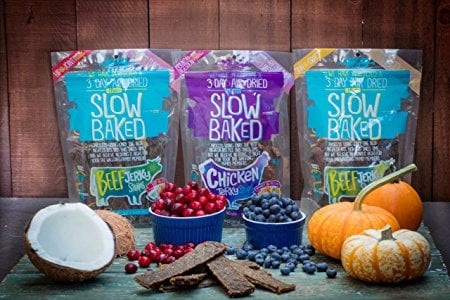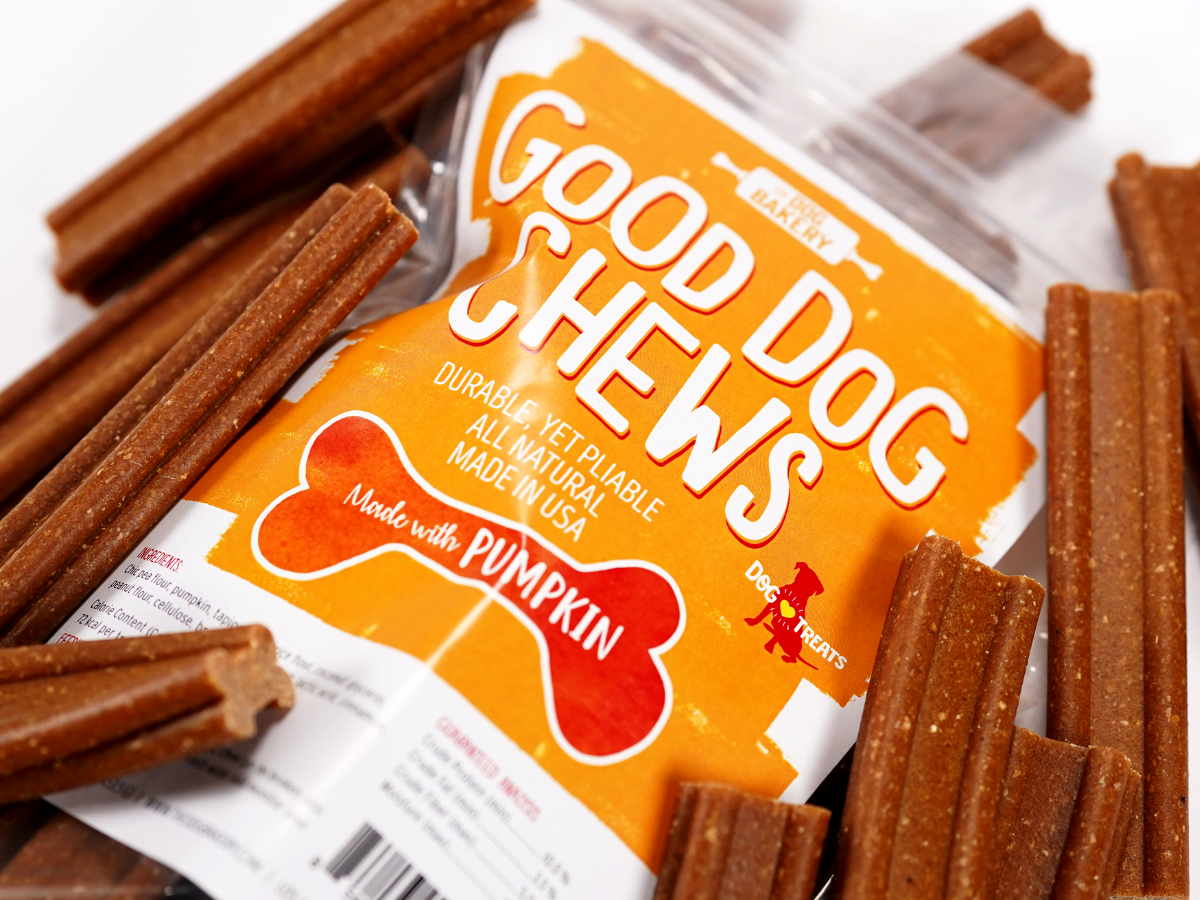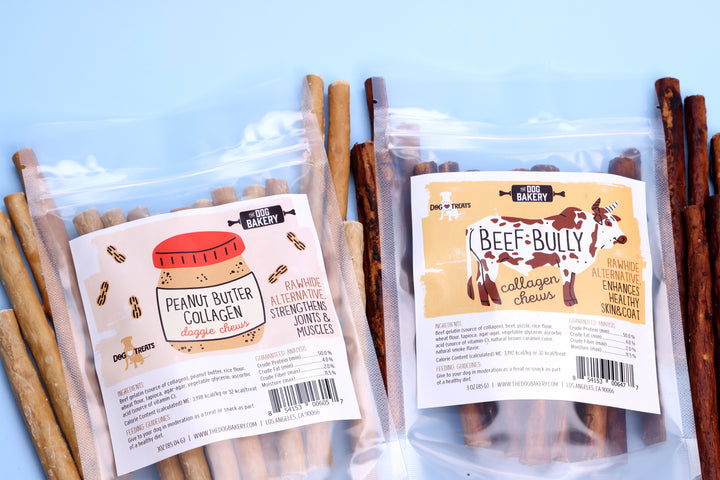3 Vet-Approved Homemade Puppy Food Recipes
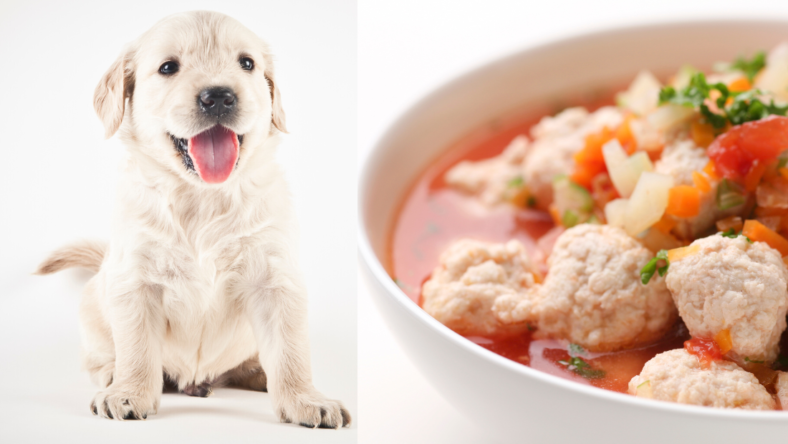
Your puppy’s diet is super important for their future health, and making home-cooked puppy food recipes requires a fair amount of reading, learning, and consultation with professionals. Not only will you need a good understanding of canine nutrition, but you’ll also need to speak with your vet to make sure your growing puppy is getting everything they need.
If you’re committed to the journey and the effort, read on, this guide is for you! Here, we’re sharing some of the best homemade puppy food recipes approved by vets, and tips to help you get started.
What is Vet-Approved Homemade Puppy Food?
So, what exactly makes homemade puppy food recipes “vet-approved?” The qualify as a vet-approved formula, a dog food recipe must meet at least one of these two criteria:
- Be formulated by a vet or canine nutritionist, or
- Be evaluated by a vet or canine nutritionist
While you might think you’ve included everything your dog needs in your homemade puppy food recipe, it’s easy to accidentally leave out vital nutrients if you’re not a trained veterinarian or nutritionist. Ensuring that the recipe you’re using is vet-approved will help you avoid inadvertently giving your puppy an incomplete diet, so be sure to follow vet-approved recipes closely.
Should You Feed Your Puppy a Homemade Diet?
Before you decide to start making DIY puppy food recipes at home, there are a few important factors to consider. Yes, homemade dog food recipes for puppies include fresh, nutritious ingredients, but it’s not always easy or efficient to make home-cooked puppy food recipes.
- Time commitment: It is way easier to go to the pet store or buy dog food online than it is to make homemade dog food at home. Home cooking for your puppy is a major time commitment and one you can’t fall behind on. Not only will you need to take the time to prepare the food for your puppy, but you’ll also need to spend time shopping, planning, and stocking up on essential items.
- Financial commitment: Making fresh puppy food recipes is often more expensive than buying puppy food from the store. While you may be able to reduce overall costs by buying in bulk, making your own dog food still requires a fairly substantial financial investment. Dogs—puppies included—need variety in their diet, and you’ll likely end up sourcing certain specialty ingredients from exclusive and niche stores where prices can be quite high. If you’re looking for a way to save a few bucks on your puppy’s food, making it at home won’t help you out.
- Nutritional knowledge & consultation: Unfortunately, the vast majority of homemade dog foods are lacking in essential nutrients. This is either due to intentional dietary exclusions made by the dog owner, lack of adequate resources, or genuine ignorance of canine nutrition. For puppies, especially, a diet lacking vital nutrients can inhibit proper growth and future health. To decide whether or not you should be making your puppy dog food recipes at home, ask yourself if you are willing and able to follow explicit instructions from a veterinarian or canine nutritionist.
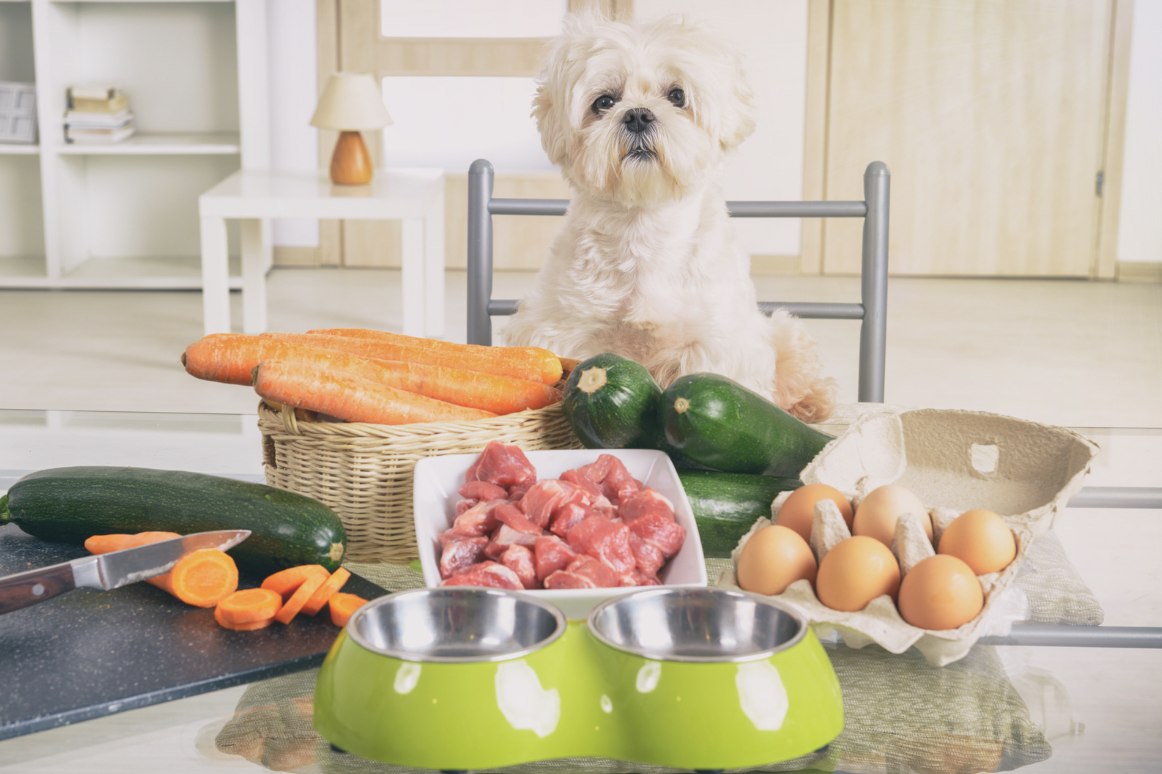
What to Watch for When Feeding Puppies Homemade Dog Food
Growing puppies need different nutrients than full-grown adult dogs. Puppies need more protein to fuel proper growth and development, and a higher ratio of vitamins and minerals like calcium and zinc to support energy, bone density, neurological development, and so on.
While some adult dog foods might have the right ratio of protein, they won’t have the appropriate portion of nutrients for developing puppies. For this reason, it’s important to use a puppy-specific recipe and speak with your veterinarian for more in-depth instructions for your puppy.
It’s also very important to consider your puppy’s breed when feeding them. Small-breed puppies have different nutritional needs than large-breed puppies and breeds mature and grow at very different rates. Some smaller breeds will be full-grown by a year old, while larger breeds can take up to two years to reach full maturity. Proper nutrition during this period of growth is so important and can set your puppy up for a long, happy, and healthy adulthood.
Take a look at the basic feeding requirements for puppies according to veterinarians Krista Williams and Robin Downing.
| Ingredient Type | Dry Matter Balance | Sources |
| Protein | 22–32% or more | Chicken, turkey, beef, salmon, duck, whitefish, eggs… |
| Fat | ~10–25% | Poultry skin, fish oil, flaxseed oil, safflower oil, vegetable oil… |
| Carbohydrates | ~20% | Rice, sweet potatoes, potatoes, oats, barley… |
| Fruits & Vegetables | ~5% | Broccoli, spinach, blueberries, apples… |
| Calcium | ~0.7–1.7% | Crushed eggshells, bone meal, sardines… |
| Additional Nutrients | Follow vet’s recommendation | Follow vet’s recommendation |
As mentioned above, many homemade food recipes for puppies and adult dogs are lacking in vital nutrients. While we recommend speaking with your vet about supplements to add to your puppy’s food, a good place to start is with The One. A daily canine supplement designed to work well with homemade and store-bought diets, The One can safely be used for puppies ages 12 weeks and up!
How To Prepare Homemade Food for Puppies
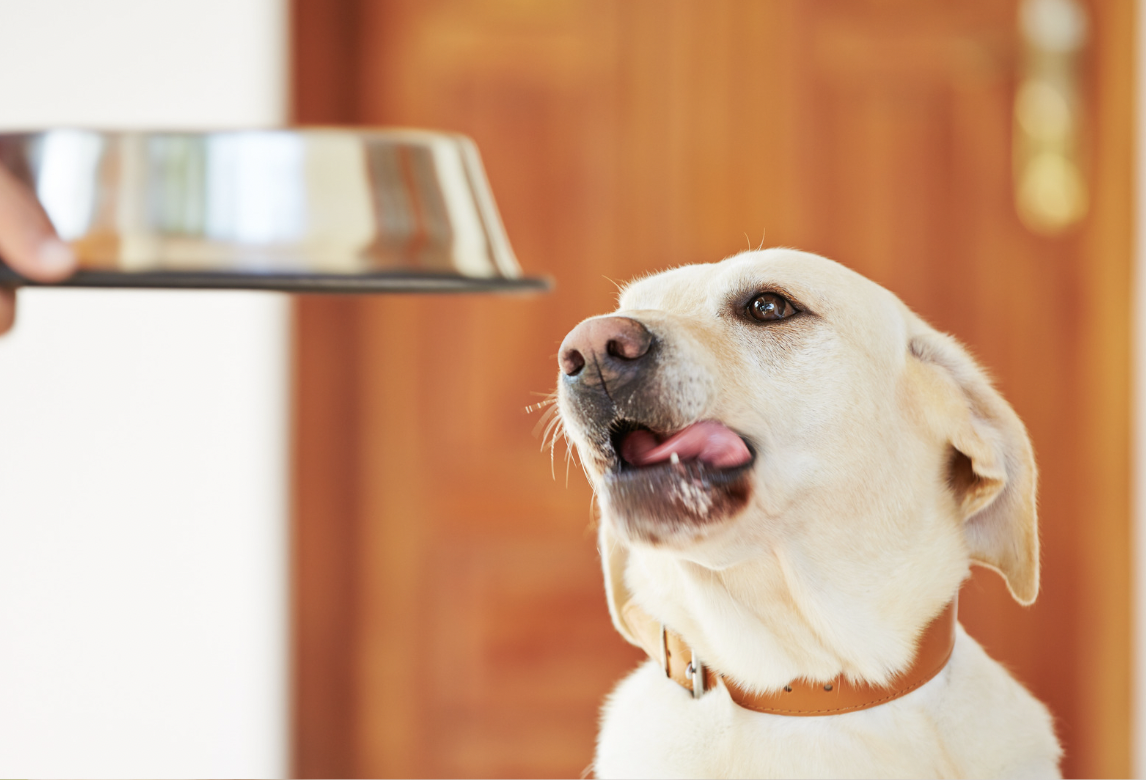
Beyond choosing the right recipe/formula to feed your puppy, how you prepare their food can make all the difference. Safe handling of the ingredients used to make their food, proper storage, and regular cleaning routines can keep your puppy safe from food-borne illnesses and prevent food waste.
- Remember to wash your hands before you begin preparing the food, while you are working, and once you have finished.
- Since you will be dealing with raw meat, make sure to disinfect surfaces once you have finished cooking to prevent the spread of germs.
- Keep the containers, utensils, or areas of the fridge/freezer for your puppy’s food separate from the ones used for human food. Keeping them separate is not only beneficial for your health but also for the health of your puppy.
- Instead of storing extra homemade puppy food in the fridge, try pre-portioning and freezing it. Puppy food will last much longer in the freezer and will take only around 12 hours to thaw in the fridge before serving.
- After every meal, use hot, soapy water to wash your puppy’s bowl.
3 Basic Homemade Recipes for Puppies
In your search for the best recipe for puppy food on the internet, you’ve probably noticed that there just aren’t very many. It’s especially hard to find homemade puppy food recipes that have been approved by vets, which is why we love Build.It so much!
Build.It creates custom homemade puppy recipes based on your puppy’s specific details, traits, and dietary needs. To give you an idea of how it works, we’ve chosen three homemade recipes for puppies from three different categories: small-breed puppy food recipes, large-breed puppy food recipes, and novel protein puppy recipes.
1. Homemade Chicken Puppy Food Recipe for Small Breeds
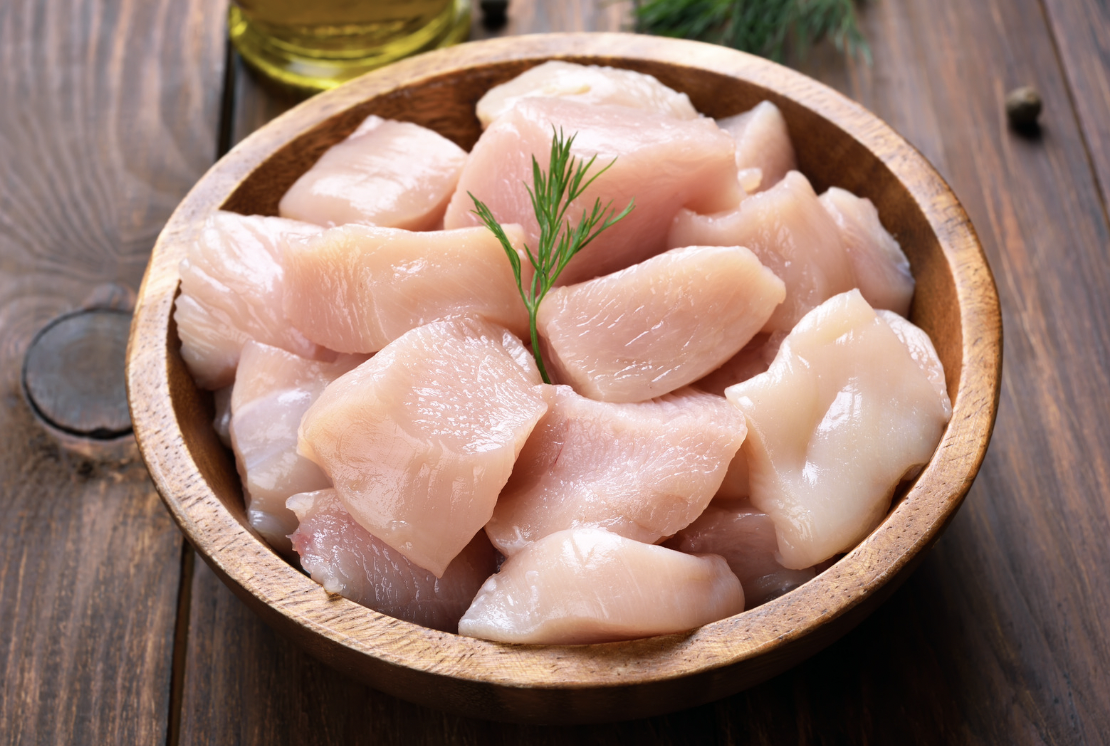
This recipe is chicken-based and makes 2 servings (or one day of food) for an 8-pound, 6-month-old small-breed puppy. Because this is designed for a small breed, it won’t have enough nutrients for large breed puppies, even if they are the same weight. Remember, puppy feeding guidelines aren’t just based on weight—breed, age, and growth matters, too.
Nutritional Information:
- Calories: 550
- Protein: 47.7%
- Fat: 33.4%
- Carbohydrates: 19%
Ingredients
- 6 ¾ oz. cooked chicken breast
- 3 tsp canola oil
- ½ mL omega oil (try this one from Plano Paws)
- 80 g white rice
- ⅓ tsp iodized salt
- Small-dog serving of daily supplement (we recommend Pet Wellness Direct)
Instructions
- Chop cooked chicken into bite-sized pieces.
- Combine all ingredients in a bowl and mix well.
2. Pork & Bean Large Breed Puppy Food Recipe
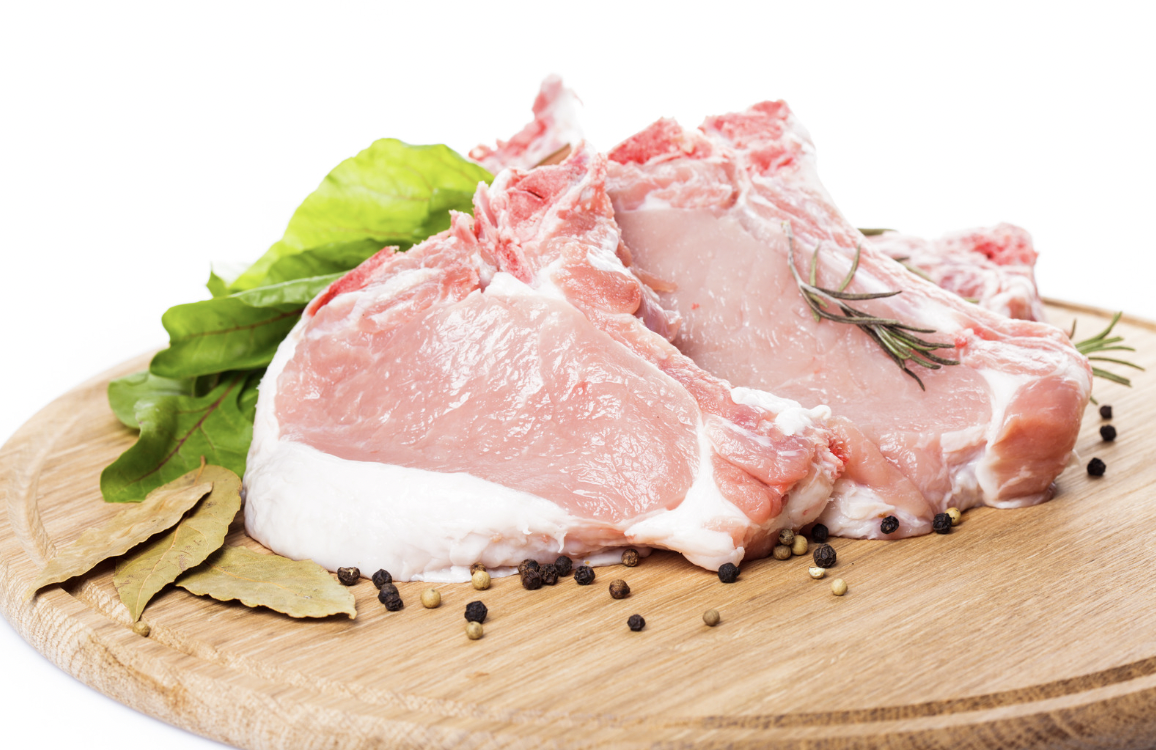
Some puppies are just big, and large-breed pups have their own unique dietary needs. To support those big bones and strong muscles, large-breed puppies need more calories and more nutrient-dense diets than small-breed pups. This recipe for homemade puppy food makes 2 servings—or one day’s worth of food—for a 50-pound, 6-month-old large-breed puppy.
Nutritional Information:
- Calories: 1902
- Protein: 46%
- Fat: 35%
- Carbohydrates: 18.8%
Ingredients
- 28 oz. pork loin
- 3 TBSP canola oil
- 3 mL omega oil (try this one from Plano Paws)
- 31 oz raw pinto beans
- 2 tsp iodized salt
- 4 ¼ oz. water
- Small-dog serving of daily supplement (we recommend Pet Wellness Direct)
Instructions
- Slice the pork loin into small, bite-sized pieces and add to a large pot.
- Add canola oil, omega oil, pinto beans, salt, and water to the pot along with the pork.
- Cook on medium to medium-low heat, stirring regularly until the pinto beans are fully cooked through. You may need to add more water throughout the cooking process to hydrate beans. Reduce the heat as needed to prevent burning, and avoid cooking off moisture too quickly.
- Remove the pot from the heat and let cool.
- Add daily multivitamins, mix, and serve.
3. Novel Protein Puppy Food Recipe
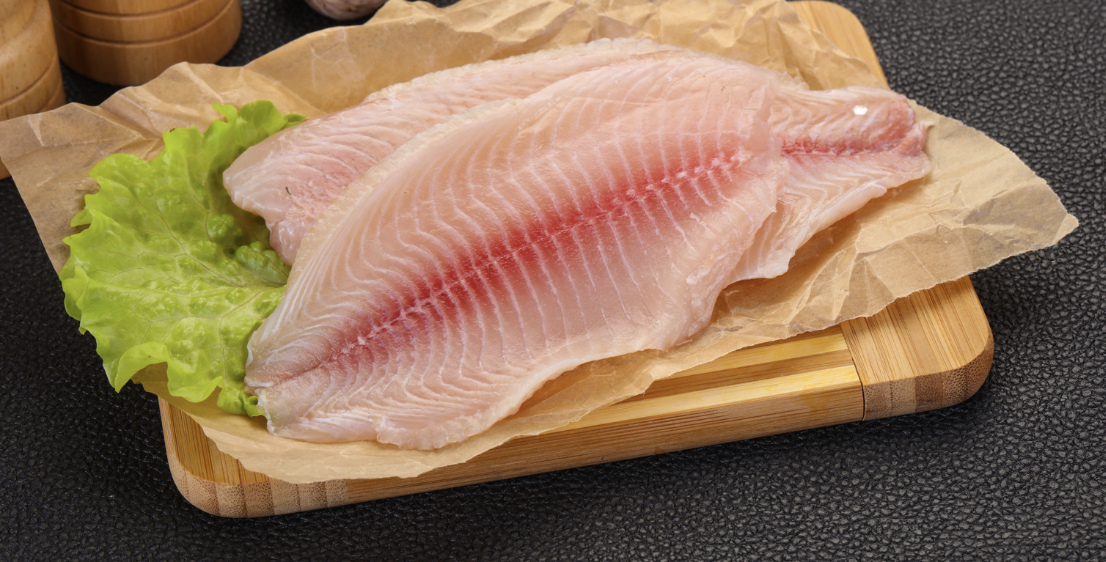
If your puppy has food allergies and can’t eat traditional proteins like chicken, turkey, or beef, try feeding them a novel protein like fish! The recipe we’ve chosen to feature is tilapia-based, but other fish like salmon, cod, and tuna also work well. Formulated to make 2 servings—or one day’s worth of food—for a 30-pound 6-month-old puppy, this recipe is super easy and asks you to cook ingredients separately before combining them.
Nutritional Information:
- Calories: 1488
- Protein: 48.1%
- Fat: 33%
- Carbohydrates: 19%
Ingredients
- 23 ½ oz. tilapia, lightly roasted or poached
- 8 tsp canola oil
- 2 ⅓ mL omega oil (try this one from Plano Paws)
- 338 g sweet potato, baked in skins, flesh removed and cooled
- 1 tsp iodized salt
- Small-dog serving of daily supplement (we recommend Pet Wellness Direct)
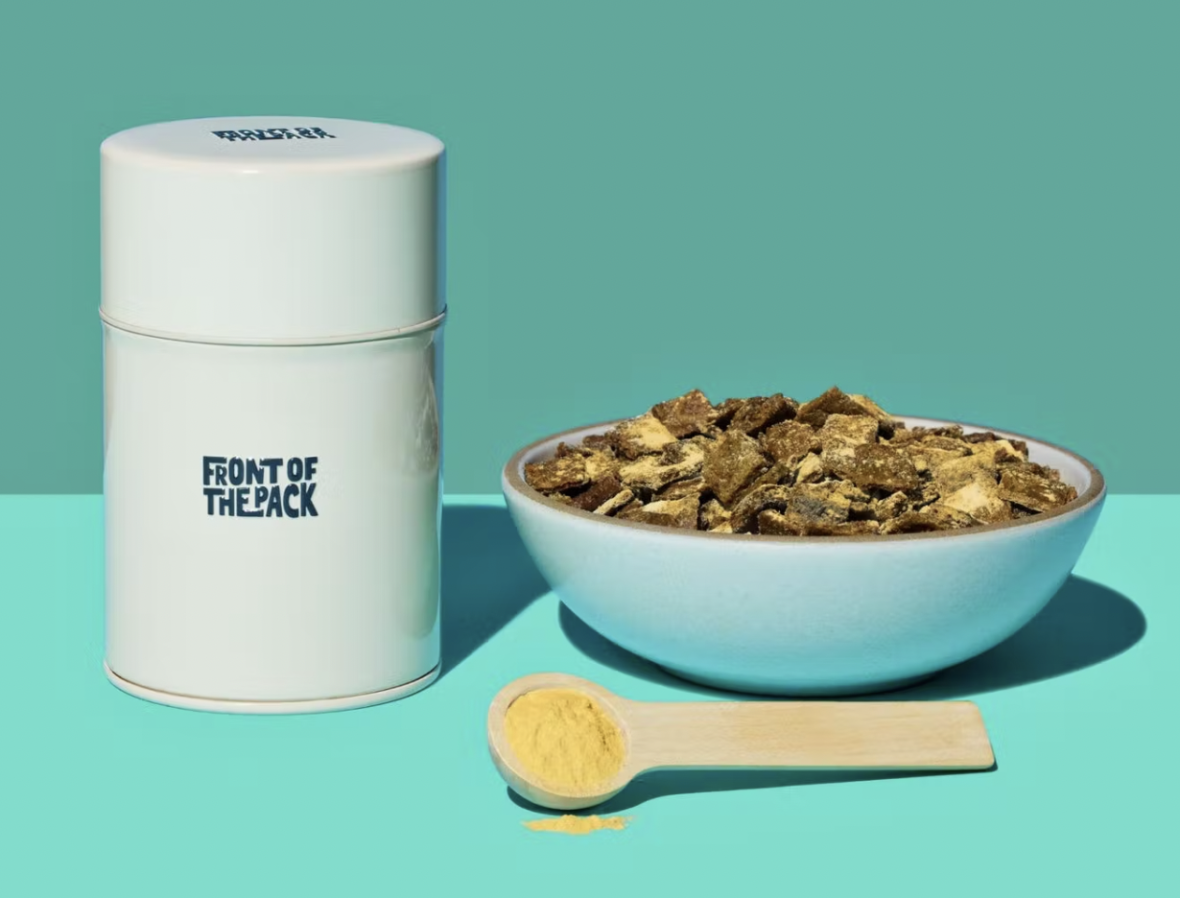
Instructions
- Combine cooked tilapia, canola oil, omega oil, baked/cooled sweet potato flesh, and salt in a large bowl.
- Mix all ingredients thoroughly to combine. The finished mixture will almost look like a mash.
- Add your dog’s multivitamin and serve.
Vet-Approved Homemade Puppy Food Recipes FAQ
Phew—that was a lot of information to take in! Chances are, you probably have some more questions. Here are our answers to some of the common queries we get about dog food recipes for puppies.
Is it okay to feed puppies homemade food?
Yes, as long as you discuss their diet with a veterinarian. Homemade food can be nutritious and well-balanced, but you’ll need to make sure you are consulting with a professional to avoid leaving accidental gaps in your puppy’s diet.
How do you make complete puppy food?
By following vet-approved food recipes for puppies. One of our number one tip is to use a recipe generator like Balance.It. Recipes on this website are vet-approved and can be customized based on your puppy’s specific traits. You can find homemade puppy food, small-breed recipes, large-breed recipes, and recipes for any special dietary needs.
Are eggs good for puppies?
Yes! Eggs are safe for puppies—as long as they don’t have an allergy or sensitivity—and can be included as part of a balanced diet in healthy puppy food recipes.
What is the best homemade food for puppies?
The best puppy food recipes are always vet-approved, nutritionally complete, and biologically appropriate.
In this blog, we’ve included a selection of recipes for homemade puppy food from a website called Balance.It. Developed by a board-certified veterinary nutritionist, Balance.It is one of the best resources on the internet for finding nutritionally complete recipes for puppy food.
Is homemade puppy food better than store-bought?
Not necessarily. Store-bought dog foods are required to meet certain standards for canine nutrition, and will always be nutritionally complete. While it is possible to make balanced homemade food for puppies, recipes created by everyday dog owners are rarely nutritionally complete.
While feeding your dog freshly made food using nutritional ingredients is of course beneficial for their health, you’ll need to talk to a vet to make sure you aren’t leaving any gaps.
What is the healthiest way to feed a puppy?
There is a lot of debate as to what the healthiest way to feed a puppy is. Some people believe that kibble is the best and only way to feed a dog, while others are adamant that raw diets are the gold standard.
Ultimately, the best and healthiest way to feed a puppy is by ensuring they are getting a balanced diet complete with all of the nutrients they need to play, grow, and be happy! If the best option for you and your puppy is to buy kibble, that’s great! If you want to make your own puppy homemade food recipes, that’s great too!
As long as your pup is fed and healthy, you’re doing great!
Related Articles:
- Best Puppy Food for German Shepherds
- Top 6 Dog Foods for French Bulldog Puppies
- 3 Vet-Approved Pup Loaf Recipes Your Dog Will Love
- 4 Vet-Approved Homemade Dog Food Recipes

